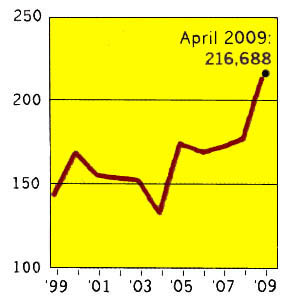|
Social Security early retirement benefits decision |
|
|
|
|
|
Boomers Life Welcome to one of the most popular Baby Boomer sites on the web. Everyone born between 1946 and 1964 is a Boomer just like us. And even though we may have challenges facing us, we also have an open future ahead. His ongoing campaign is to help us enjoy all the good things we have. Welcome to our world. Our Music Our Interests Health and fitness innovations Baby Boom generation experiences Issues for work and retirement Number of Boomers in each U.S. state Surprising increase in Social Security claims Bodhi Tree Bookstore Closing is a Boomer Experience Do Boomers still care? Protests then and now Our People More
Joni Mitchell - Blue album
Share a smile with a friend. Tell them about this site or mention it on your blog. Links are good too--and we will post yours. A smile a day keeps the doctor away.
BoomersLife.org Contact Us You are welcome to comment on a posting or share some info on your own experiences (today or back in the day). Sanford Holst Editor © 2008-2024 Boomers Life |
More Boomers Choose Early Social Security Retirement Benefits Summary: This report shows what Boomers are doing as they reach the early-retirement age of 62, when they can choose to start receiving Social Security benefits. As shown in the Los Angeles Times -- but based on nationwide data -- many more Boomers are taking that early-retirement option than had been expected. They are going this way even though it means reduced benefits each year for the rest of their life -- which could be 20 years or more. The economic crisis and loss of jobs are thought to be two of the major reasons for this unexpected trend. Will it continue? What will the Boomers who follow them do? Watch for future reports here. More Opt for Early Benefits Instead of seeing older workers staying on the job longer as the economy has worsened, the Social Security system is reporting a major surge in early retirement claims that could have implications for the financial security of millions of baby boomers. Since the current federal fiscal year began Oct. 1, claims have been running 25% ahead of last year, compared with the 15% increase that had been projected as the post-World War II generation reaches eligibility for early retirement, according to Stephen C. Goss, chief actuary for the Social Security Administration. Many of the additional retirements are probably laid-off workers who are claiming Social Security early, despite reduced benefits, because they are under immediate financial pressure, Goss and other analysts believe. The numbers upend expectations that older Americans who sustained financial losses in the recession would work longer to rebuild their nest eggs. In a December poll sponsored by CareerBuilder, 60% of workers older than 60 said they planned to postpone retirement. Goss
said it remained unclear whether the uptick in retirements would
accelerate or abate in the months ahead. But another wave of older workers
may opt for early retirement when they exhaust unemployment benefits late
this year or early in 2010, he noted. Social Security retirement benefits claims 2009
Chart shows new Social Security claims as of April each year (scale in thousands). Source: Social Security Admin- istration. Graphics re- porting by Tom Reinken of the L.A. Times. On top of savings ravaged by the stock market decline and the loss of home equity, many retirees now must make do with Social Security benefits reduced by as much as 25% if they retire at age 62 instead of 66. "When the recession ends and the economy bounces back, there may be a band of people for whom things will never be the same again. They'll still be paying the price for 10, 20, 30 years down the road," said Cristina Martin Firvida, director of economic security for AARP, the nation's largest membership organization for people 50 and older. For Herman Hilton, 66, of Jacksonville, Fla., a lean 6-foot-2 electrician with a bushy gray beard, the decision to lay down his pliers and screwdriver was born of frustration. For at least the last 10 years, as he wired new buildings, he was looking toward retiring as soon as he hit 66 and qualified for full benefits. And last fall, like millions of other older workers, Hilton put his "golden years" plan on hold when his 401(k) lost more than a third of its value. Then last month, his life took another unwelcome turn: Hilton's foreman pulled him aside to tell him that he was being laid off. For several weeks, Hilton collected unemployment insurance. But he soon decided to call it quits and file for Social Security. "I can live on what I have," Hilton said. "But it's not what I planned on. I won't have the comfort factor of as much of a safety cushion." That cushion is important. As Americans live longer, the elderly are increasingly at risk of outlasting their financial assets. That's a serious problem for them and their families, who are often called upon to provide assistance. Because benefits are reduced for people who retire early, the surge in retirements should not have any long-term effect on the solvency of the Social Security system, although it will probably add to the near-term budget deficits confronting the Obama administration, Social Security's Goss said. The full consequences of retirement decisions made in hard times will become apparent when people who retired early begin to exhaust their savings. "As they get into their 70s and 80s, it will be increasingly inadequate," said Alicia H. Munnell, director of the Center for Retirement Research at Boston College. The most severe effect will probably fall on the unemployed widows of workers who retire early, Munnell said. Survivors' benefits also take a deeper cut when people retire early -- reduced as much as 30% for retirement at 62. Because women tend to live longer than men, that leaves them more vulnerable to running out of money as expenses for assisted living and other costs rise in advanced old age. Significant numbers of workers have long chosen to retire early. In 2007, the most recent year for which statistics are available, 42% of men and 48% of women began collecting Social Security retirement benefits at age 62, the first year of eligibility. The current recession, the worst since the Depression, is striking when older workers are by historical standards unusually vulnerable. Though older workers in previous recessions were less likely than their younger counterparts to be laid off, that advantage has eroded in recent years, said Munnell, who analyzed more than two decades of Labor Department data on layoffs. Fewer workers are now protected by union contracts that require newer employees to be laid off first. And older workers now typically have less of a seniority advantage in a workforce that more frequently switches jobs. Once they lose their jobs, older workers have a harder time finding new ones. On average, it takes laid-off workers 55 and older nearly a month longer than their younger counterparts to find new employment, and the gulf has been growing recently, according to the U.S. Bureau of Labor Statistics. Goss said it was theoretically possible that people who claimed retirement benefits during the recession would resume working once the economy improves. Yet experience suggests that retired workers are unlikely to return to work in large numbers, particularly not to full-time jobs that would allow them to make up their earnings losses while they were out of the workforce, said Paul N. Van de Water, a former senior policy official at the Social Security Administration and now a senior fellow at the Center on Budget and Policy Priorities, a Washington think tank. "It's partly a question of intent," Van de Water said. "It's partly a question of your skills not being kept up to date." Article by Mike Dorning, Los Angeles Times, reporting from Washington. An online version of the article can be found here, under the title "Early retirement claims increase dramatically" http://www.latimes.com/news/nationworld/nation/ la-na-retirement24-2009may24,0,885521.story
|
|
Related article: "More U.S. workers retiring early" |
|
|
For additional issues of interest to Boomers click here.
|
|
|
Our purpose is to help rebuild the Boomer community, and our justifiable pride in it, as well as to enjoy a better life for ourselves and those important to us. May all the best be yours. |
|
|
music, people and issues of interest to Boomers |
|
|
|
|




 The
ramifications of the trend are profound for the new retirees, their
families, the government and other social institutions that may be called
upon to help support them.
The
ramifications of the trend are profound for the new retirees, their
families, the government and other social institutions that may be called
upon to help support them.